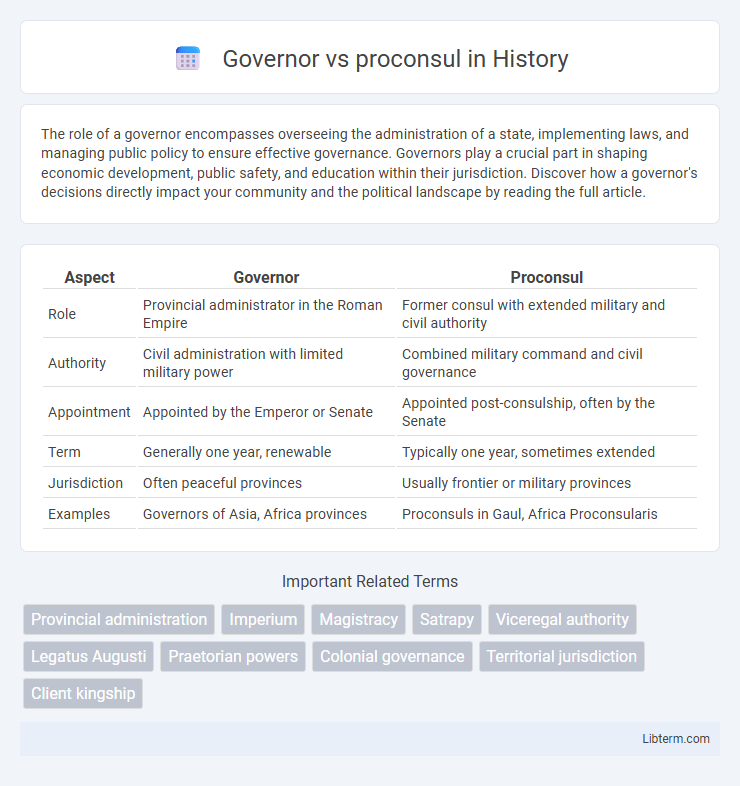The role of a governor encompasses overseeing the administration of a state, implementing laws, and managing public policy to ensure effective governance. Governors play a crucial part in shaping economic development, public safety, and education within their jurisdiction. Discover how a governor's decisions directly impact your community and the political landscape by reading the full article.
Table of Comparison
| Aspect | Governor | Proconsul |
|---|---|---|
| Role | Provincial administrator in the Roman Empire | Former consul with extended military and civil authority |
| Authority | Civil administration with limited military power | Combined military command and civil governance |
| Appointment | Appointed by the Emperor or Senate | Appointed post-consulship, often by the Senate |
| Term | Generally one year, renewable | Typically one year, sometimes extended |
| Jurisdiction | Often peaceful provinces | Usually frontier or military provinces |
| Examples | Governors of Asia, Africa provinces | Proconsuls in Gaul, Africa Proconsularis |
Definition of Governor and Proconsul
A governor is an official appointed to administer and govern a specific province or territory within an empire, responsible for maintaining law, order, and tax collection. A proconsul, originally a Roman magistrate, acts as a former consul granted extended authority to govern a province with military and civil powers, often during periods of war or expansion. The key distinction lies in the proconsul's typically greater autonomy and military command compared to the more administrative and localized role of a governor.
Historical Origins of the Governor and Proconsul Roles
The historical origins of the governor role trace back to Roman provincial administration, where governors acted as the emperor's representatives overseeing civil and military duties. Proconsuls, emerging during the Roman Republic, were former consuls appointed as provincial commanders with imperium, wielding significant military and judicial authority. The evolution from proconsul to governor reflects Rome's transition from republic to imperial structure, shifting focus from military conquest to administrative governance.
Appointment and Selection Process
Governors were typically appointed by the Roman Emperor or Senate and often selected from the senatorial class based on political influence or merit, serving fixed terms in provinces. Proconsuls, usually former consuls, were appointed by the Senate to govern senatorial provinces, with selection emphasizing prior high office experience and prestige. The appointment of governors involved imperial or senatorial discretion, while proconsuls were chosen specifically for their proven administrative and military capabilities.
Jurisdiction and Scope of Authority
Governors in the Roman Empire held civil and military authority over provinces, wielding judicial powers and managing local administration with a focus on law enforcement and tax collection. Proconsuls, typically former consuls, governed senatorial provinces with broader autonomy, often commanding greater military forces and presiding over more significant legal matters, reflecting a higher rank and more extensive jurisdiction than governors. The scope of a proconsul's authority generally encompassed both administrative duties and supreme military command, while governors operated under the oversight of the emperor or Senate, with more limited jurisdiction.
Governance Structures and Responsibilities
Governors in ancient Roman provinces held civil and military authority, administering justice, collecting taxes, and maintaining order under the Senate's supervision. Proconsuls, typically former consuls granted extended authority, governed senatorial provinces with higher prestige and often commanded larger military forces during significant campaigns. Both roles involved regional governance but differed in appointment, scope of power, and military command based on imperial or senatorial jurisdiction.
Relationship with Central Government
Governors in the Roman Empire operated under direct authority from the Emperor and Senate, maintaining a hierarchical relationship with the central government through formal appointments and regular accountability. Proconsuls, often former magistrates granted imperium for provincial command, exercised considerable autonomous power but were still subject to imperial oversight and Senate directives. The balance between local autonomy and central control defined their effectiveness in administering provinces while aligning with Rome's strategic interests.
Term Length and Tenure Differences
Governors of Roman provinces typically served fixed terms ranging from one to three years, ensuring regular rotation and accountability within the Roman administrative system. Proconsuls, often former consuls, held their positions usually for one year but could receive prorogation, extending their tenure significantly based on military or political needs. This flexibility in proconsul tenure contrasts with the more rigid term limits imposed on governors, reflecting differing roles and levels of independence in provincial governance.
Key Powers and Limitations
Governors in Roman provinces held both military command and civil administrative authority, including tax collection, law enforcement, and local governance, but their powers were restricted by the Senate's oversight and periodic audits. Proconsuls, often former consuls appointed for one-year terms, wielded supreme military command and judicial authority within their provinces, possessing greater autonomy especially in senatorial provinces. However, proconsuls faced limitations such as fixed term lengths and the requirement to respect local customs and senatorial decrees, ensuring a balance between imperial control and provincial autonomy.
Notable Examples in History
Julius Caesar exemplified the proconsul role as governor of Gaul, wielding extensive military and administrative powers beyond a typical Roman governor's scope. Cicero served as a governor of Cilicia with judicial responsibilities but lacked the broader imperium associated with proconsuls. The distinction is marked by proconsuls' often extended commands and military authority, while governors primarily managed provincial administration without commanding armies.
Legacy and Modern Relevance
Governors in ancient Rome wielded significant civil and military authority within provinces, shaping regional governance models that influenced the development of modern administrative roles. Proconsuls, originally appointed for military command, evolved to govern expansive territories, setting precedents for delegated imperial authority and regional autonomy. Their legacy persists in contemporary concepts of delegated governance, balancing centralized power with local administration in modern political systems.
Governor Infographic

 libterm.com
libterm.com